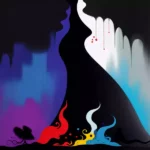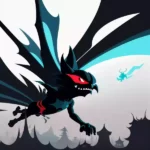 | |
The Encantadas; or, Enchanted Isles | |
| Author | Herman Melville |
|---|---|
| Published |
1850
|
| Language | English |
| Nationality | American |
| Genre | Adventure, American Literature |
1850 Short Story
The Encantadas; or, Enchanted Isles
The Encantadas; or, Enchanted Isles is an English Adventure, American Literature short story by American writer Herman Melville. It was first published in 1850.
The Encantadas; or, Enchanted Isles
by Herman Melville
(1854)SKETCH FIRST.THE ISLES AT LARGE. –“That may not be, said then the ferryman, Least we unweeting hap to be fordonne; For those same islands seeming now and than, Are not firme land, nor any certein wonne, But stragling plots which to and fro do ronne In the wide waters; therefore are they hight The Wandering Islands; therefore do them shonne; For they have oft drawne many a wandring wight Into most deadly daunger and distressed plight; For whosoever once hath fastened His foot thereon may never it secure But wandreth evermore uncertein and unsure.”
* * * * *
“Darke, dolefull, dreary, like a greedy grave, That still for carrion carcasses doth crave; On top whereof ay dwelt the ghastly owl, Shrieking his balefull note, which ever drave Far from that haunt all other cheerful fowl, And all about it wandring ghosts did wayle and howl.”
Take five-and-twenty heaps of cinders dumped here and there in anoutside city lot; imagine some of them magnified into mountains, andthe vacant lot the sea; and you will have a fit idea of the generalaspect of the Encantadas, or Enchanted Isles. A group rather of extinctvolcanoes than of isles; looking much as the world at large might, aftera penal conflagration.
It is to be doubted whether any spot of earth can, in desolateness,furnish a parallel to this group. Abandoned cemeteries of long ago, oldcities by piecemeal tumbling to their ruin, these are melancholy enough;but, like all else which has but once been associated with humanity,they still awaken in us some thoughts of sympathy, however sad. Hence,even the Dead Sea, along with whatever other emotions it may at timesinspire, does not fail to touch in the pilgrim some of his lessunpleasurable feelings.
And as for solitariness; the great forests of the north, the expanses ofunnavigated waters, the Greenland ice-fields, are the profoundest ofsolitudes to a human observer; still the magic of their changeable tidesand seasons mitigates their terror; because, though unvisited by men,those forests are visited by the May; the remotest seas reflect familiarstars even as Lake Erie does; and in the clear air of a fine Polar day,the irradiated, azure ice shows beautifully as malachite.
But the special curse, as one may call it, of the Encantadas, that whichexalts them in desolation above Idumea and the Pole, is, that to themchange never comes; neither the change of seasons nor of sorrows. Cut bythe Equator, they know not autumn, and they know not spring; whilealready reduced to the lees of fire, ruin itself can work little moreupon them. The showers refresh the deserts; but in these isles, rainnever falls. Like split Syrian gourds left withering in the sun, theyare cracked by an everlasting drought beneath a torrid sky. “Have mercyupon me,” the wailing spirit of the Encantadas seems to cry, “and sendLazarus that he may dip the tip of his finger in water and cool mytongue, for I am tormented in this flame.”
Another feature in these isles is their emphatic uninhabitableness. Itis deemed a fit type of all-forsaken overthrow, that the jackal shouldden in the wastes of weedy Babylon; but the Encantadas refuse to harboreven the outcasts of the beasts. Man and wolf alike disown them. Littlebut reptile life is here found: tortoises, lizards, immense spiders,snakes, and that strangest anomaly of outlandish nature, the _aguano_.No voice, no low, no howl is heard; the chief sound of life here is ahiss.
On most of the isles where vegetation is found at all, it is moreungrateful than the blankness of Aracama. Tangled thickets of wirybushes, without fruit and without a name, springing up among deepfissures of calcined rock, and treacherously masking them; or a parchedgrowth of distorted cactus trees.
In many places the coast is rock-bound, or, more properly,clinker-bound; tumbled masses of blackish or greenish stuff like thedross of an iron-furnace, forming dark clefts and caves here and there,into which a ceaseless sea pours a fury of foam; overhanging them with aswirl of gray, haggard mist, amidst which sail screaming flights ofunearthly birds heightening the dismal din. However calm the seawithout, there is no rest for these swells and those rocks; they lashand are lashed, even when the outer ocean is most at peace with, itself.On the oppressive, clouded days, such as are peculiar to this part ofthe watery Equator, the dark, vitrified masses, many of which raisethemselves among white whirlpools and breakers in detached and perilousplaces off the shore, present a most Plutonian sight. In no world but afallen one could such lands exist.
Those parts of the strand free from the marks of fire, stretch away inwide level beaches of multitudinous dead shells, with here and theredecayed bits of sugar-cane, bamboos, and cocoanuts, washed upon thisother and darker world from the charming palm isles to the westward andsouthward; all the way from Paradise to Tartarus; while mixed with therelics of distant beauty you will sometimes see fragments of charredwood and mouldering ribs of wrecks. Neither will any one be surprised atmeeting these last, after observing the conflicting currents which eddythroughout nearly all the wide channels of the entire group. Thecapriciousness of the tides of air sympathizes with those of the sea.Nowhere is the wind so light, baffling, and every way unreliable, and sogiven to perplexing calms, as at the Encantadas. Nigh a month has beenspent by a ship going from one isle to another, though but ninety milesbetween; for owing to the force of the current, the boats employed totow barely suffice to keep the craft from sweeping upon the cliffs, butdo nothing towards accelerating her voyage. Sometimes it is impossiblefor a vessel from afar to fetch up with the group itself, unless largeallowances for prospective lee-way have been made ere its coming insight. And yet, at other times, there is a mysterious indraft, whichirresistibly draws a passing vessel among the isles, though not bound tothem.
True, at one period, as to some extent at the present day, large fleetsof whalemen cruised for spermaceti upon what some seamen call theEnchanted Ground. But this, as in due place will be described, was offthe great outer isle of Albemarle, away from the intricacies of thesmaller isles, where there is plenty of sea-room; and hence, to thatvicinity, the above remarks do not altogether apply; though even therethe current runs at times with singular force, shifting, too, with assingular a caprice.
Indeed, there are seasons when currents quite unaccountable prevail fora great distance round about the total group, and are so strong andirregular as to change a vessel’s course against the helm, thoughsailing at the rate of four or five miles the hour. The difference inthe reckonings of navigators, produced by these causes, along with thelight and variable winds, long nourished a persuasion, that thereexisted two distinct clusters of isles in the parallel of theEncantadas, about a hundred leagues apart. Such was the idea of theirearlier visitors, the Buccaneers; and as late as 1750, the charts ofthat part of the Pacific accorded with the strange delusion. And thisapparent fleetingness and unreality of the locality of the isles wasmost probably one reason for the Spaniards calling them the Encantada,or Enchanted Group.
But not uninfluenced by their character, as they now confessedly exist,the modern voyager will be inclined to fancy that the bestowal of thisname might have in part originated in that air of spell-bound desertnesswhich so significantly invests the isles. Nothing can better suggest theaspect of once living things malignly crumbled from ruddiness intoashes. Apples of Sodom, after touching, seem these isles.
However wavering their place may seem by reason of the currents, theythemselves, at least to one upon the shore, appear invariably the same:fixed, cast, glued into the very body of cadaverous death.
Nor would the appellation, enchanted, seem misapplied in still anothersense. For concerning the peculiar reptile inhabitant of thesewilds–whose presence gives the group its second Spanish name,Gallipagos–concerning the tortoises found here, most mariners have longcherished a superstition, not more frightful than grotesque. Theyearnestly believe that all wicked sea-officers, more especiallycommodores and captains, are at death (and, in some cases, before death)transformed into tortoises; thenceforth dwelling upon these hotaridities, sole solitary lords of Asphaltum.
Doubtless, so quaintly dolorous a thought was originally inspired by thewoe-begone landscape itself; but more particularly, perhaps, by thetortoises. For, apart from their strictly physical features, there issomething strangely self-condemned in the appearance of these creatures.Lasting sorrow and penal hopelessness are in no animal form sosuppliantly expressed as in theirs; while the thought of their wonderfullongevity does not fail to enhance the impression.
Nor even at the risk of meriting the charge of absurdly believing inenchantments, can I restrain the admission that sometimes, even now,when leaving the crowded city to wander out July and August among theAdirondack Mountains, far from the influences of towns andproportionally nigh to the mysterious ones of nature; when at such timesI sit me down in the mossy head of some deep-wooded gorge, surrounded byprostrate trunks of blasted pines and recall, as in a dream, my otherand far-distant rovings in the baked heart of the charmed isles; andremember the sudden glimpses of dusky shells, and long languid necksprotruded from the leafless thickets; and again have beheld thevitreous inland rocks worn down and grooved into deep ruts by ages andages of the slow draggings of tortoises in quest of pools of scantywater; I can hardly resist the feeling that in my time I have indeedslept upon evilly enchanted ground.
Nay, such is the vividness of my memory, or the magic of my fancy, thatI know not whether I am not the occasional victim of optical delusionconcerning the Gallipagos. For, often in scenes of social merriment, andespecially at revels held by candle-light in old-fashioned mansions, sothat shadows are thrown into the further recesses of an angular andspacious room, making them put on a look of haunted undergrowth oflonely woods, I have drawn the attention of my comrades by my fixed gazeand sudden change of air, as I have seemed to see, slowly emerging fromthose imagined solitudes, and heavily crawling along the floor, theghost of a gigantic tortoise, with “Memento * * * * *” burning in liveletters upon his back. * * * * *SKETCH SECOND.
TWO SIDES TO A TORTOISE. “Most ugly shapes and horrible aspects, Such as Dame Nature selfe mote feare to see, Or shame, that ever should so fowle defects From her most cunning hand escaped bee; All dreadfull pourtraicts of deformitee. No wonder if these do a man appall; For all that here at home we dreadfull hold Be but as bugs to fearen babes withall Compared to the creatures in these isles’ entrall
* * * * *
“Fear naught, then said the palmer, well avized, For these same monsters are not there indeed, But are into these fearful shapes disguized.
* * * * *
“And lifting up his vertuous staffe on high, Then all that dreadful armie fast gan flye Into great Zethy’s bosom, where they hidden lye.”
In view of the description given, may one be gay upon the Encantadas?Yes: that is, find one the gayety, and he will be gay. And, indeed,sackcloth and ashes as they are, the isles are not perhaps unmitigatedgloom. For while no spectator can deny their claims to a most solemn andsuperstitious consideration, no more than my firmest resolutions candecline to behold the spectre-tortoise when emerging from its shadowyrecess; yet even the tortoise, dark and melancholy as it is upon theback, still possesses a bright side; its calipee or breast-plate beingsometimes of a faint yellowish or golden tinge. Moreover, every oneknows that tortoises as well as turtle are of such a make, that if youbut put them on their backs you thereby expose their bright sideswithout the possibility of their recovering themselves, and turning intoview the other. But after you have done this, and because you have donethis, you should not swear that the tortoise has no dark side. Enjoy thebright, keep it turned up perpetually if you can, but be honest, anddon’t deny the black. Neither should he, who cannot turn the tortoisefrom its natural position so as to hide the darker and expose hislivelier aspect, like a great October pumpkin in the sun, for that causedeclare the creature to be one total inky blot. The tortoise is bothblack and bright. But let us to particulars.
Some months before my first stepping ashore upon the group, my ship wascruising in its close vicinity. One noon we found ourselves off theSouth Head of Albemarle, and not very far from the land. Partly by wayof freak, and partly by way of spying out so strange a country, a boat’screw was sent ashore, with orders to see all they could, and besides,bring back whatever tortoises they could conveniently transport.
It was after sunset, when the adventurers returned. I looked down overthe ship’s high side as if looking down over the curb of a well, anddimly saw the damp boat, deep in the sea with some unwonted weight.Ropes were dropt over, and presently three huge antediluvian-lookingtortoises, after much straining, were landed on deck. They seemed hardlyof the seed of earth. We had been broad upon the waters for five longmonths, a period amply sufficient to make all things of the land wear afabulous hue to the dreamy mind. Had three Spanish custom-house officersboarded us then, it is not unlikely that I should have curiously staredat them, felt of them, and stroked them much as savages serve civilizedguests. But instead of three custom-house officers, behold these reallywondrous tortoises–none of your schoolboy mud-turtles–but black aswidower’s weeds, heavy as chests of plate, with vast shells medallionedand orbed like shields, and dented and blistered like shields that havebreasted a battle, shaggy, too, here and there, with dark green moss,and slimy with the spray of the sea. These mystic creatures, suddenlytranslated by night from unutterable solitudes to our peopled deck,affected me in a manner not easy to unfold. They seemed newly crawledforth from beneath the foundations of the world. Yea, they seemed theidentical tortoises whereon the Hindoo plants this total sphere. With alantern I inspected them more closely. Such worshipful venerableness ofaspect! Such furry greenness mantling the rude peelings and healing thefissures of their shattered shells. I no more saw three tortoises. Theyexpanded–became transfigured. I seemed to see three Roman Coliseums inmagnificent decay.
Ye oldest inhabitants of this, or any other isle, said I, pray, give methe freedom of your three-walled towns.
The great feeling inspired by these creatures was that ofage:–dateless, indefinite endurance. And in fact that any othercreature can live and breathe as long as the tortoise of the Encantadas,I will not readily believe. Not to hint of their known capacity ofsustaining life, while going without food for an entire year, considerthat impregnable armor of their living mail. What other bodily beingpossesses such a citadel wherein to resist the assaults of Time?
As, lantern in hand, I scraped among the moss and beheld the ancientscars of bruises received in many a sullen fall among the marlymountains of the isle–scars strangely widened, swollen, halfobliterate, and yet distorted like those sometimes found in the bark ofvery hoary trees, I seemed an antiquary of a geologist, studying thebird-tracks and ciphers upon the exhumed slates trod by incrediblecreatures whose very ghosts are now defunct.
As I lay in my hammock that night, overhead I heard the slow wearydraggings of the three ponderous strangers along the encumbered deck.Their stupidity or their resolution was so great, that they never wentaside for any impediment. One ceased his movements altogether justbefore the mid-watch. At sunrise I found him butted like a battering-ramagainst the immovable foot of the foremast, and still striving, toothand nail, to force the impossible passage. That these tortoises are thevictims of a penal, or malignant, or perhaps a downright diabolicalenchanter, seems in nothing more likely than in that strange infatuationof hopeless toil which so often possesses them. I have known them intheir journeyings ram themselves heroically against rocks, and longabide there, nudging, wriggling, wedging, in order to displace them, andso hold on their inflexible path. Their crowning curse is their drudgingimpulse to straightforwardness in a belittered world.
Meeting with no such hinderance as their companion did, the othertortoises merely fell foul of small stumbling-blocks–buckets, blocks,and coils of rigging–and at times in the act of crawling over themwould slip with an astounding rattle to the deck. Listening to thesedraggings and concussions, I thought me of the haunt from which theycame; an isle full of metallic ravines and gulches, sunk bottomlesslyinto the hearts of splintered mountains, and covered for many mileswith inextricable thickets. I then pictured these three straight-forwardmonsters, century after century, writhing through the shades, grim asblacksmiths; crawling so slowly and ponderously, that not only didtoad-stools and all fungus things grow beneath their feet, but a sootymoss sprouted upon their backs. With them I lost myself in volcanicmazes; brushed away endless boughs of rotting thickets; till finally ina dream I found myself sitting crosslegged upon the foremost, a Brahminsimilarly mounted upon either side, forming a tripod of foreheads whichupheld the universal cope.
Such was the wild nightmare begot by my first impression of theEncantadas tortoise. But next evening, strange to say, I sat down withmy shipmates, and made a merry repast from tortoise steaks, and tortoisestews; and supper over, out knife, and helped convert the three mightyconcave shells into three fanciful soup-tureens, and polished the threeflat yellowish calipees into three gorgeous salvers. * * * * *SKETCH THIRD.
ROCK RODONDO. “For they this tight the Rock of vile Reproach, A dangerous and dreadful place, To which nor fish nor fowl did once approach, But yelling meaws with sea-gulls hoars and bace And cormoyrants with birds of ravenous race, Which still sit waiting on that dreadful clift.”
* * * * *
“With that the rolling sea resounding soft In his big base them fitly answered, And on the Rock, the waves breaking aloft, A solemn ineane unto them measured.”
* * * * *
“Then he the boteman bad row easily, And let him heare some part of that rare melody.”
* * * * *
“Suddeinly an innumerable flight Of harmefull fowles about them fluttering cride, And with their wicked wings them oft did smight And sore annoyed, groping in that griesly night.”
* * * * *
“Even all the nation of unfortunate And fatal birds about them flocked were.”
To go up into a high stone tower is not only a very fine thing initself, but the very best mode of gaining a comprehensive view of theregion round about. It is all the better if this tower stand solitaryand alone, like that mysterious Newport one, or else be sole survivorof some perished castle.
Now, with reference to the Enchanted Isles, we are fortunately suppliedwith just such a noble point of observation in a remarkable rock, fromits peculiar figure called of old by the Spaniards, Rock Rodondo, orRound Rock. Some two hundred and fifty feet high, rising straight fromthe sea ten miles from land, with the whole mountainous group to thesouth and east. Rock Rodondo occupies, on a large scale, very much theposition which the famous Campanile or detached Bell Tower of St. Markdoes with respect to the tangled group of hoary edifices around it.
Ere ascending, however, to gaze abroad upon the Encantadas, thissea-tower itself claims attention. It is visible at the distance ofthirty miles; and, fully participating in that enchantment whichpervades the group, when first seen afar invariably is mistaken for asail. Four leagues away, of a golden, hazy noon, it seems some SpanishAdmiral’s ship, stacked up with glittering canvas. Sail ho! Sail ho!Sail ho! from all three masts. But coming nigh, the enchanted frigateis transformed apace into a craggy keep.
My first visit to the spot was made in the gray of the morning. With aview of fishing, we had lowered three boats and pulling some two milesfrom our vessel, found ourselves just before dawn of day close under themoon-shadow of Rodondo. Its aspect was heightened, and yet softened, bythe strange double twilight of the hour. The great full moon burnt inthe low west like a half-spent beacon, casting a soft mellow tinge uponthe sea like that cast by a waning fire of embers upon a midnighthearth; while along the entire east the invisible sun sent pallidintimations of his coming. The wind was light; the waves languid; thestars twinkled with a faint effulgence; all nature seemed supine withthe long night watch, and half-suspended in jaded expectation of thesun. This was the critical hour to catch Rodondo in his perfect mood.The twilight was just enough to reveal every striking point, withouttearing away the dim investiture of wonder.
From a broken stair-like base, washed, as the steps of a water-palace,by the waves, the tower rose in entablatures of strata to a shavensummit. These uniform layers, which compose the mass, form its mostpeculiar feature. For at their lines of junction they project flatlyinto encircling shelves, from top to bottom, rising one above another ingraduated series. And as the eaves of any old barn or abbey are alivewith swallows, so were all these rocky ledges with unnumbered sea-fowl.Eaves upon eaves, and nests upon nests. Here and there were longbirdlime streaks of a ghostly white staining the tower from sea to air,readily accounting for its sail-like look afar. All would have beenbewitchingly quiescent, were it not for the demoniac din created by thebirds. Not only were the eaves rustling with them, but they flew denselyoverhead, spreading themselves into a winged and continually shiftingcanopy. The tower is the resort of aquatic birds for hundreds of leaguesaround. To the north, to the east, to the west, stretches nothing buteternal ocean; so that the man-of-war hawk coming from the coasts ofNorth America, Polynesia, or Peru, makes his first land at Rodondo. Andyet though Rodondo be terra-firma, no land-bird ever lighted on it.Fancy a red-robin or a canary there! What a falling into the hands ofthe Philistines, when the poor warbler should be surrounded by suchlocust-flights of strong bandit birds, with long bills cruel as daggers.
I know not where one can better study the Natural History of strangesea-fowl than at Rodondo. It is the aviary of Ocean. Birds light herewhich never touched mast or tree; hermit-birds, which ever fly alone;cloud-birds, familiar with unpierced zones of air.
Let us first glance low down to the lowermost shelf of all, which is thewidest, too, and but a little space from high-water mark. Whatoutlandish beings are these? Erect as men, but hardly as symmetrical,they stand all round the rock like sculptured caryatides, supporting thenext range of eaves above. Their bodies are grotesquely misshapen; theirbills short; their feet seemingly legless; while the members at theirsides are neither fin, wing, nor arm. And truly neither fish, flesh, norfowl is the penguin; as an edible, pertaining neither to Carnival norLent; without exception the most ambiguous and least lovely creature yetdiscovered by man. Though dabbling in all three elements, and indeedpossessing some rudimental claims to all, the penguin is at home innone. On land it stumps; afloat it sculls; in the air it flops. As ifashamed of her failure, Nature keeps this ungainly child hidden away atthe ends of the earth, in the Straits of Magellan, and on the abasedsea-story of Rodondo.
But look, what are yon wobegone regiments drawn up on the next shelfabove? what rank and file of large strange fowl? what sea Friars ofOrders Gray? Pelicans. Their elongated bills, and heavy leathern pouchessuspended thereto, give them the most lugubrious expression. A pensiverace, they stand for hours together without motion. Their dull, ashyplumage imparts an aspect as if they had been powdered over withcinders. A penitential bird, indeed, fitly haunting the shores of theclinkered Encantadas, whereon tormented Job himself might have well satdown and scraped himself with potsherds.
Higher up now we mark the gony, or gray albatross, anomalously socalled, an unsightly unpoetic bird, unlike its storied kinsman, which isthe snow-white ghost of the haunted Capes of Hope and Horn.
As we still ascend from shelf to shelf, we find the tenants of the towerserially disposed in order of their magnitude:–gannets, black andspeckled haglets, jays, sea-hens, sperm-whale-birds, gulls of allvarieties:–thrones, princedoms, powers, dominating one above another insenatorial array; while, sprinkled over all, like an ever-repeated flyin a great piece of broidery, the stormy petrel or Mother Cary’s chickensounds his continual challenge and alarm. That this mysterioushummingbird of ocean–which, had it but brilliancy of hue, might, fromits evanescent liveliness, be almost called its butterfly, yet whosechirrup under the stern is ominous to mariners as to the peasant thedeath-tick sounding from behind the chimney jamb–should have itsspecial haunt at the Encantadas, contributes, in the seaman’s mind, nota little to their dreary spell.
As day advances the dissonant din augments. With ear-splitting cries thewild birds celebrate their matins. Each moment, flights push from thetower, and join the aerial choir hovering overhead, while their placesbelow are supplied by darting myriads. But down through all this discordof commotion, I hear clear, silver, bugle-like notes unbrokenly falling,like oblique lines of swift-slanting rain in a cascading shower. I gazefar up, and behold a snow-white angelic thing, with one long, lance-likefeather thrust out behind. It is the bright, inspiriting chanticleer ofocean, the beauteous bird, from its bestirring whistle of musicalinvocation, fitly styled the “Boatswain’s Mate.”
The winged, life-clouding Rodondo had its full counterpart in the finnyhosts which peopled the waters at its base. Below the water-line, therock seemed one honey-comb of grottoes, affording labyrinthinelurking-places for swarms of fairy fish. All were strange; manyexceedingly beautiful; and would have well graced the costliest glassglobes in which gold-fish are kept for a show. Nothing was more strikingthan the complete novelty of many individuals of this multitude. Herehues were seen as yet unpainted, and figures which are unengraved.
To show the multitude, avidity, and nameless fearlessness and tamenessof these fish, let me say, that often, marking through clear spaces ofwater–temporarily made so by the concentric dartings of the fish abovethe surface–certain larger and less unwary wights, which swam slow anddeep; our anglers would cautiously essay to drop their lines down tothese last. But in vain; there was no passing the uppermost zone. Nosooner did the hook touch the sea, than a hundred infatuates contendedfor the honor of capture. Poor fish of Rodondo! in your victimizedconfidence, you are of the number of those who inconsiderately trust,while they do not understand, human nature.
But the dawn is now fairly day. Band after band, the sea-fowl sail awayto forage the deep for their food. The tower is left solitary save thefish-caves at its base. Its birdlime gleams in the golden rays like thewhitewash of a tall light-house, or the lofty sails of a cruiser. Thismoment, doubtless, while we know it to be a dead desert rock othervoyagers are taking oaths it is a glad populous ship.
But ropes now, and let us ascend. Yet soft, this is not so easy. * * * * *SKETCH FOURTH.
A PISGAH VIEW FROM THE ROCK. –“That done, he leads him to the highest mount, From whence, far off he unto him did show:”–
If you seek to ascend Rock Rodondo, take the following prescription. Gothree voyages round the world as a main-royal-man of the tallest frigatethat floats; then serve a year or two apprenticeship to the guides whoconduct strangers up the Peak of Teneriffe; and as many morerespectively to a rope-dancer, an Indian juggler, and a chamois. Thisdone, come and be rewarded by the view from our tower. How we get there,we alone know. If we sought to tell others, what the wiser were they?Suffice it, that here at the summit you and I stand. Does anyballoonist, does the outlooking man in the moon, take a broader view ofspace? Much thus, one fancies, looks the universe from Milton’scelestial battlements. A boundless watery Kentucky. Here Daniel Boonewould have dwelt content.
Never heed for the present yonder Burnt District of the Enchanted Isles.Look edgeways, as it were, past them, to the south. You see nothing; butpermit me to point out the direction, if not the place, of certaininteresting objects in the vast sea, which, kissing this tower’s base,we behold unscrolling itself towards the Antarctic Pole.
We stand now ten miles from the Equator. Yonder, to the East, some sixhundred miles, lies the continent; this Rock being just about on theparallel of Quito.
Observe another thing here. We are at one of three uninhabited clusters,which, at pretty nearly uniform distances from the main, sentinel, atlong intervals from each other, the entire coast of South America. In apeculiar manner, also, they terminate the South American character ofcountry. Of the unnumbered Polynesian chains to the westward, not onepartakes of the qualities of the Encantadas or Gallipagos, the isles ofSt. Felix and St. Ambrose, the isles Juan-Fernandez and Massafuero. Ofthe first, it needs not here to speak. The second lie a little above theSouthern Tropic; lofty, inhospitable, and uninhabitable rocks, one ofwhich, presenting two round hummocks connected by a low reef, exactlyresembles a huge double-headed shot. The last lie in the latitude of33; high, wild and cloven. Juan Fernandez is sufficiently famouswithout further description. Massafuero is a Spanish name, expressive ofthe fact, that the isle so called lies _more without_, that is, furtheroff the main than its neighbor Juan. This isle Massafuero has a veryimposing aspect at a distance of eight or ten miles. Approached in onedirection, in cloudy weather, its great overhanging height and ruggedcontour, and more especially a peculiar slope of its broad summits, giveit much the air of a vast iceberg drifting in tremendous poise. Itssides are split with dark cavernous recesses, as an old cathedral withits gloomy lateral chapels. Drawing nigh one of these gorges from sea,after a long voyage, and beholding some tatterdemalion outlaw, staff inhand, descending its steep rocks toward you, conveys a very queeremotion to a lover of the picturesque.
On fishing parties from ships, at various times, I have chanced tovisit each of these groups. The impression they give to the strangerpulling close up in his boat under their grim cliffs is, that surely hemust be their first discoverer, such, for the most part, is theunimpaired … silence and solitude. And here, by the way, the mode inwhich these isles were really first lighted upon by Europeans is notunworthy of mention, especially as what is about to be said, likewiseapplies to the original discovery of our Encantadas.
Prior to the year 1563, the voyages made by Spanish ships from Peru toChili, were full of difficulty. Along this coast, the winds from theSouth most generally prevail; and it had been an invariable custom tokeep close in with the land, from a superstitious conceit on the part ofthe Spaniards, that were they to lose sight of it, the eternaltrade-wind would waft them into unending waters, from whence would be noreturn. Here, involved among tortuous capes and headlands, shoals andreefs, beating, too, against a continual head wind, often light, andsometimes for days and weeks sunk into utter calm, the provincialvessels, in many cases, su







